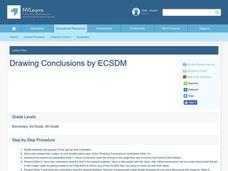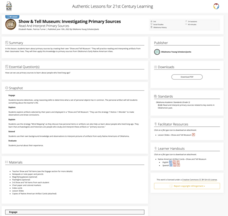Curated OER
Drawing Conclusions from Historical Fiction
Students read historical fiction. In this drawing conclusions lesson, students learn how to draw conclusions from text, specifically historical fiction. Students read Molly's Pilgrim and complete a graphic organizer where they answer...
Curated OER
Mini-Lesson Planning for Inferences
Making inferences and drawing conclusions is a key component to successful active reading. Encourage your class to use context clues and prior knowledge to infer different elements of a story, including the setting, plot, and character...
Roald Dahl
The Twits - The Monkeys Escape
Houses come in all shapes and sizes, but not all houses are safe from Mr. and Mrs. Twit. The 10th lesson in a unit designed to accompany The Twits by Roald Dahl turns learners into architects. While designing houses for the monkeys, they...
Curated OER
Lesson: Possible Perspectives
Visual art is the inspiration for a creative writing activity focused on having learners write from different perspectives. They analyze the image Yellow Rain Jacket, picking out details to help their storytelling. They use the details...
Pennsylvania Department of Education
Drawing Conclusions Based on Literary Elements
Learners compare versions of Cinderella and draw conclusions based on the story elements identified. In this literacy comprehension and story elements lesson plan, students read several versions of Cinderella, complete a "Comparing...
Curated OER
Drawing Conclusions and Comparing/Contrasting - The Everglades
Learners complete activities to compare, contrast, and draw conclusions for a lesson plan about the Florida Everglades. In this drawing conclusions lesson plan, students watch videos about a scientists study of pig frogs that live in the...
Curated OER
Drawing Conclusions: Polka Town, U.S.A.
Students draw conclusions based on a video they watch about towns that thrive on Polka music. In this drawing conclusions lesson plan, students discuss the conclusions with each other based on the implied information they see in the video.
Curated OER
Lesson 1: Explicit Information versus drawing conclusions
Second graders look at the difference between explicit information and drawing conclusions. In this drawing conclusions lesson, 2nd graders read a passage and find areas where information is given and others where they have to think to...
Curated OER
Recognizing Litter
When does trash become litter? Use this litter awareness lesson to help them understand the importance of trash disposal. Get learners engaged by reading Nancy Loewen's Lady Lulu Liked to Litter (not included). After discussing what...
Curated OER
Lesson Five: Review Cause and Effect, Draw Conclusions, Compare and Contrast
Third graders review the concepts of compare and contrast, drawing conclusions, and cause and effect. In this literary elements lesson, 3rd graders write a paragraph that compares and contrasts the past to the present. They show cause...
Curated OER
Understanding a Story
Reading comprehension is the name of the game! After listening to the teacher model and share personal prior knowledge about small children and what they do with food, the class discusses how they too can use prior knowledge to...
Curated OER
Drawing Conclusions
Students view images and draw conclusions based on what they see happening in the pictures. For this drawing conclusions lesson plan, students also write a paragraph and their classmates have to draw a conclusion based on their writing.
School Specialty
The Tortoise and the Hare - Drawing Conclusions/Predictions Outcomes
Does the fastest one always win the race? Look deeper into The Tortoise and the Hare with a set of discussion questions for before, during, and after reading the story.
Curated OER
Explicit Information versus Drawing Conclusions
Fourth graders read a comprehension passage and answer short answer questions and then identify their answers as explicit information or drawing conclusions. In this comprehension lesson plan, 4th graders do this as a whole and individuals.
EngageNY
Drawing a Conclusion from an Experiment (part 1)
Challenge your classes to complete an experiment from beginning to end. Learners make their own hypotheses, collect and analyze their own data, and make their own conclusions. They are on their way to becoming statisticians!
Curated OER
Drawing Conclusions-Miss Navajo
Students practice the higher order thinking skill of drawing conclusions. In this language lesson, students use the Miss Navajo pageant to discuss the role of language in selecting a winner. They view portions of the pageant, and try...
Curated OER
Speed
Fifth and sixth graders practice working in pairs to determine whether they can walk with constant speed. They test themselves, collect their data, draw graphs with their data collected, manipulate the data, and then draw conclusions...
Benjamin Franklin Tercentenary
Let’s Throw an Electric Science Party!
Are you looking for a shockingly good lesson plan? Check out one that has middle schoolers recreate four of Benjamin Franklin's experiments. Groups investigate, observe, and draw conclusions about static electricity and electrical...
Curated OER
Verbal Cues
Help young learners practice drawing conclusions and using reasoning through this simple game idea. The teacher places a mystery object in a bag and learners must ask yes/no questions until they guess what it is correctly. As a model of...
Curated OER
Little Boy Blue
First graders read nursery rhymes and celebrate Mother Goose. For this drawing conclusions and predicting lesson, 1st graders create new ending for the nursery rhymes. Students gather data and make a graph showing their favorite rhyme.
Curated OER
Lesson 3: Identifying Clues to Help Solve a Mystery
In this reading comprehension lesson, 6th graders read the novel, The Westing Game, by Ellen Raskin. Students practice exploring the process of drawing conclusions from details to solve a mystery. Students interact with a Clue Tracker...
NASA
Christa's Lost Lesson: Effervescence
How are chemical reactions affected by gravity? Learners explore the phenomenon of effervescence as part of the Christa's Lost Lessons series. They compare findings in an experiment on effervescence to a video of a similar experiment in...
K20 LEARN
Show and Tell Museum - Investigating Primary Sources: Read and Interpret Primary Sources
Scholars become detectives in a lesson that focuses on primary sources. Learners practice their observational skills by examining the teacher's artifact and visiting the Show and Tell Museum that highlihgts items from peers and learning...
Center for Learning in Action
Investigating Physical and Chemical Changes
Super scientists visit ten stations to predict, observe, and draw conclusions about the physical and chemical changes that occur when different states of matter—liquid, solid, and gas—are placed under a variety of conditions. To...

























